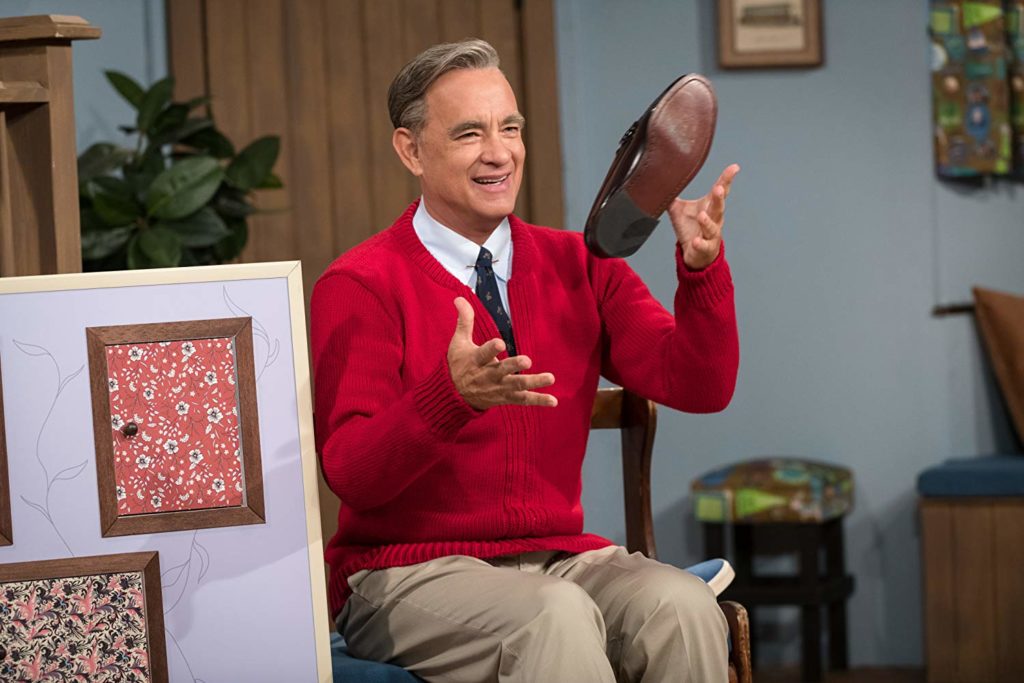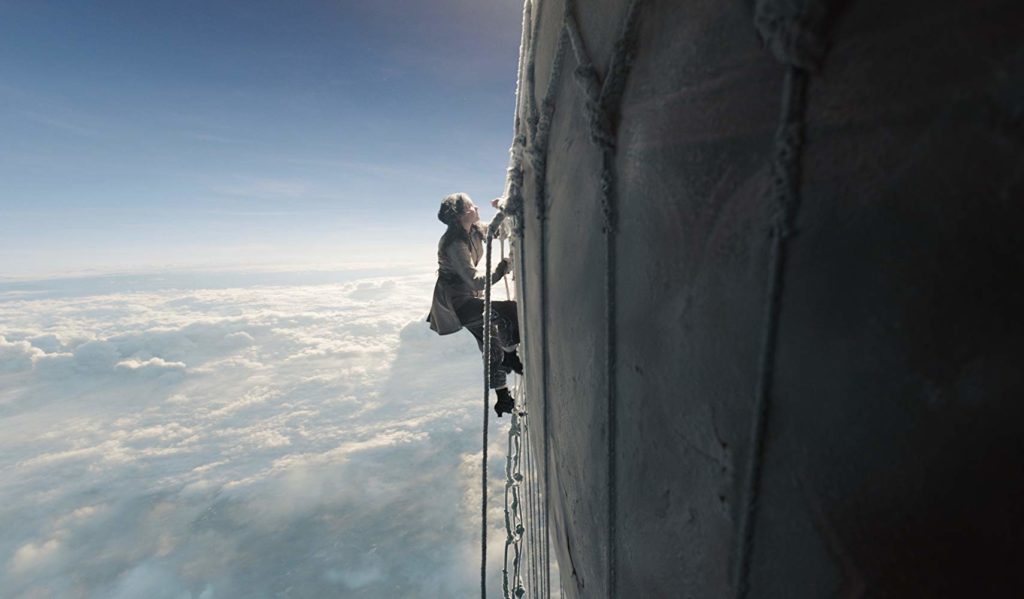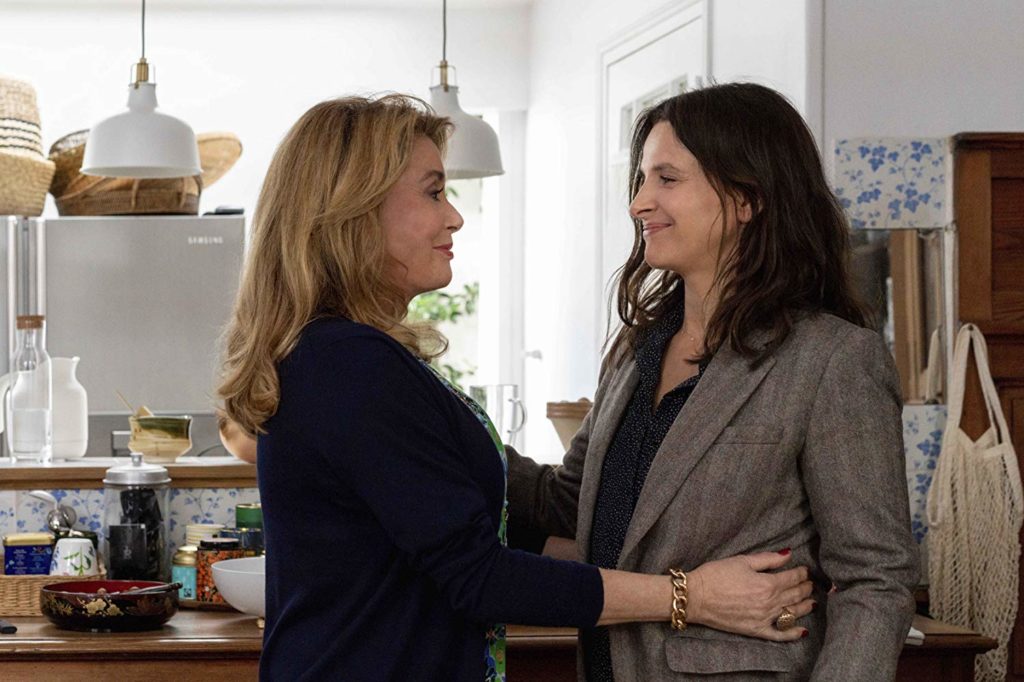With 245 features competing for your attention at the Toronto International Film Festival, it’s easy to succumb to FOMO (that’s Fear Of Missing Out for the acronym-averse). You make your tentative schedule, then you arrive at TIFF and start hearing buzz about films that never landed on your radar. And soon, you regret choosing that star- or director-driven movie that didn’t live up to your expectations.
I already knew I’d be missing out by not fitting Noah Baumbach’s acclaimed Marriage Story into my schedule, and I was annoyed that I wasn’t able to score a ticket to Ford v Ferrari. Other buzzy films I missed include Waves, Hustlers, Uncut Gems, Honey Boy, and The True History of the Kelly Gang.
But overall, it was another fulfilling TIFF experience. I’ve already discussed high points The Two Popes, Dolemite Is My Name, The Personal History of David Copperfield, Knives Out, The Report, and Jojo Rabbit. Here’s a select rundown of the rest:
Can an actor win an Oscar for a lackluster movie? It’s happened on occasion (Elizabeth Taylor, Art Carney, Rami Malek just last year), and this season the test case will be Renée Zellweger in the title role of Judy (from Roadside Attractions). This biopic of legendary performer Judy Garland in her final years is clunky and heavy-handed, especially in the flashback scenes where Louis B. Mayer abuses his teenage star in ponderous monologues and a Nurse Ratched type forbids young Judy from taking a bite out of a hamburger. But Zellweger, whose career cooled after Cinderella Man in 2005, is remarkably persuasive as the witty, astringent, alcohol and pill-addicted, financially strapped Garland, booked for a series of nightclub appearances in London. She bravely tackles some of Garland’s signature numbers and doesn’t embarrass herself, and she’s more than up to the dramatic demands of the role of a superstar in decline. The Toronto audience gave her a lengthy standing ovation, and she’s looking like an Academy frontrunner despite the wobbly vehicle she props up.

The other awards-seeking “J” film in Toronto was Joker, the surprise winner of the Golden Lion at the Venice Film Festival just a few days earlier. Todd Phillips’ origin story for one of the comic book world’s most indelible villains is consciously Scorsesean—it’s like a mash-up of Taxi Driver and King of Comedy, and it even has Robert De Niro, this time as the talk-show host who is idolized by the loner played by Joaquin Phoenix. Phillips replicates the bleak urban decay of ’70s movies (and ’70s reality), but it’s the 2019 reverberations that truly disturb. Phoenix’s Arthur Fleck (a skin-crawlingly intense performance) is a portrait of mental illness left untreated and brutalized, and the violence he unleashes evokes the many mass shooting incidents plaguing today’s America. As artful as the filmmaking is, this Warner Bros. release is a movie without light or hope, as nihilistic a piece of “entertainment” as we’ll see this year.

And now for something completely different: After seeing last year’s delightful documentary about children’s TV host Fred Rogers, Won’t You Be My Neighbor?, I expected Sony’s A Beautiful Day in the Neighborhood to be a conventional biopic. Instead, Mr. Rogers is a supporting player in the new film from director Marielle Heller (Can You Ever Forgive Me?). The main story is about Esquire journalist Tom Junod (here called Lloyd Vogel and played by Matthew Rhys of “The Americans”), who grudgingly agrees to write a 400-word profile of the TV personality. They’re an odd match: the jaded, skeptical reporter who’s estranged from his absentee father (Chris Cooper), and the too-saintly-to-be-true Mr. Rogers, with his hushed, sing-songy way of speaking. But as the documentary showed, Fred Rogers had depth: His mission was to treat children as people, respect their fears and concerns, and show them how to navigate an often cruel world. Predictably, Rogers has the same impact on Lloyd, but Rhys makes an effective audience surrogate in entering the PBS star’s gentle world. And dependable Tom Hanks fully captures the eccentricity and pure decency of this beloved TV icon.

A most unusual adventure movie is Amazon Studios’ The Aeronauts, which reunites The Theory of Everything co-stars Eddie Redmayne and Felicity Jones. Tom Harper’s film is based on the 1862 balloon flight of two bold pioneers: scientist James Glaisher (Redmayne), seeking to prove the importance of studying weather from the skies, and balloonist Amelia Wren (Jones), whose husband perished on a previous expedition. Interspersed with flashbacks detailing the duo’s backstories, the 73-minute flight is filled with hair-raising challenges: a fierce thunderstorm minutes after they take off, delirium as the air gets thinner and colder, a courageous climb to the top of the balloon when the release valve becomes stuck. The visual effects and period details are wondrous, and the two charismatic stars are well up to the physical challenges of their roles. And girls and young women will love seeing an action film in which the female is equal, if not superior, to the man.

The always rewarding Japanese director Hirokazu Kore-eda won the Cannes Palme d’Or last year for Shoplifters, and I was especially primed to see his first movie made outside of Japan, The Truth, especially since it stars two of France’s greatest actresses, Catherine Deneuve and Juliette Binoche. Deneuve, in not much of a stretch, plays a legendary French movie star, Fabienne; Binoche is her embittered daughter Lumir, a screenwriter married to an American TV actor (Ethan Hawke). Fabienne has just published her memoir, and Lumir is incensed by her self-portrait as a doting mother; later on, they will have a seemingly sincere rapprochement, but Fabienne uses it to feed her process in the science-fiction film she’s making about a mother and daughter. So what is the truth? Kore-eda’s latest is ultimately less layered than his Japanese work, but the surprise is how witty it is, considering that his script was translated from Japanese to French and English. It’s worth the price of admission just for Deneuve’s reaction when the name “Brigitte Bardot” comes up. IFC Films has U.S. rights.

TIFF is always a good place to see documentaries, and I can report on three rewarding ones. Eva Mulvad’s poignant Love Child follows an Iranian couple, Leila and Sahand, as they resettle in Turkey with their four-year-old son, Mani. They’ve been forced to flee, since Mani is the product of an extramarital affair, grounds for execution in Iran. Mulvad follows the couple over the course of seven years as they battle red tape to secure permission to move to a safer country, dealing with setback after setback. We become intimately involved in their lives, which seem to be headed to a joyous ending until politics once again intervene.

This Is Not a Movie introduces us to Robert Fisk, a longtime foreign correspondent (first for the Times of London, then The Independent after Rupert Murdoch bought The Times) based in Beirut since 1976. Fisk is highly opinionated and sometimes controversial, but Yung Chang’s doc makes a strong case for his integrity. The British native considers himself a citizen of Beirut and an advocate for his Middle Eastern neighbors, determined to challenge authority and officialdom. He’s especially incensed by the overuse of the word “terror” as a catchall term in journalism that ignores nuance. “Objectivity” and “equal time” are also absurd concepts when attempting to report the truth, he argues. With his endless wardrobe of checkered shirts, Fisk is a mundane-looking camera subject, but his career is one of bravery, bluntness and dedication.
A rather more well-known journalist (and novelist, of course) was Truman Capote, who is captured in all his outrageous glory in Ebs Burnough’s The Capote Tapes, which expands upon a series of audiotapes of friends and acquaintances George Plimpton recorded for his 1997 oral history. Capote became a literary sensation at age 24 with his pioneering gay novel Other Voices, Other Rooms, abetted by a provocative book-jacket photo of the delicate-looking, diminutive author. Breakfast at Tiffany’s and the “nonfiction novel” In Cold Blood cemented his reputation, and he became a staple of ’60s and ’70s talk shows with his wicked wit and high-pitched voice. But after In Cold Blood, he immersed himself in high society, befriending and partying with wealthy wives of business tycoons. Ostensibly, it was research for a never-published novel, Answered Prayers; when vicious excerpts were published in Esquire, his society friends shunned him. Capote died at age 59 of liver disease and drug intoxication.
The Capote Tapes covers a multitude of voices, including the writer’s adopted daughter Kate Harrington (her father was one of his lovers), who would listen to conversations and report back to the gossip-loving Capote. Among the most acerbic commentators is Capote’s longtime friend Dotson Rader, who observes that without the writer around to entertain them, his socialite friends would have “bored each other silly.” Surprisingly, one of the most empathetic comments comes from macho author Norman Mailer, who admires the courage Capote showed simply by moving proudly among straight society as himself.
The best film in the TIFF lineup was a movie I saw weeks before I arrived in Toronto—Parasite, Bong Joon-Ho’s Cannes Palme d’Or winner. Believe the hype: This wild comedy-drama about a clan of grifters who infiltrate the home and lives of a spoiled upper-class family is amazingly stylish and layered with one startling narrative surprise after another. Will it be the first Korean picture to get a Best Picture Oscar nomination? After the breakthrough success of last year’s Roma, this masterly Neon release surely has a fighting chance.


Share this post